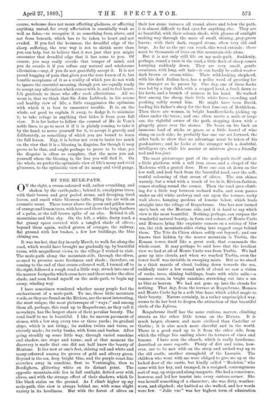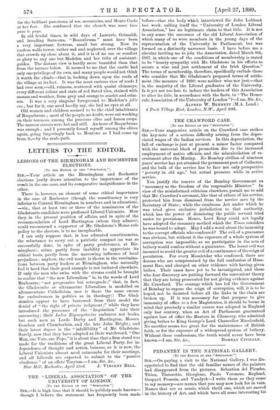BY THE MULE-PATH.
ON the right, a cream-coloured wall, rather crumbling, and shaken by the earthquake ; behind it, eucalyptus trees, with their brown and grey peeled stems, and drooping, tired leaves, and small white blossom-tufts, filling the air with an aromatic scent. These tower above the green and golden mass of orange and lemon trees, with here and there the long feathers of a palm, or the tall brown spike of an aloe. Behind it all, mountains and blue sky. On the left, a white, dusty road, a flat grassy space covered with a tangled shade of olives ; beyond them again, walled groves of oranges, the railway, Hat ground with low bushes, a few low buildings, the blue shining sea.
It was too hot, that day in early March, to walk far along the Toad, which would have brought me gradually up, by beautiful turns, with magnificent views, to the village I wished to visit. The mule-path along the mountain-side, through the olives, seemed to promise more freshness and shade ; therefore, on coming to the end of that cream-coloured wall, I turned off to the right, followed a rough road a little way, struck into one of the narrow footpaths which cross here and there under the olive shade, and soon found myself on the mule-path, to begin my stony, winding way.
I have sometimes wondered whether many people feel the enchantment of a mule-path. To me, these little mountain roads, as they are found on the Riviera, are the most interesting, the most unique, the most picturesque of " ways ;" and among them all, perhaps, this road up to Roquebrune, as they call it nowadays, has the largest share of their peculiar beauty. The road itself to me is beautiful. I like its uneven pavement of stones, with a low step every two or three yards ; its gradual slope, which is not tiring ; its sudden twists and turns, so cleverly made; its rocky banks, with ferns and bushes. After going steadily up some little way, through varied sunshine and shadow, one stops and turns ; and at that moment the discovery is made that one did not half know the beauty of Mentone. It lies now at one's feet, shining red and white and many-coloured among its groves of gold and silvery green. Beyond is the sea, deep bright blue, and the purple coast-line stretches away in sunshine, first to Ventimiglia, then to Bordighera, glittering white on its distant point. The opposite mountain-side lies in full sunlight, dotted over with olives, and with the strange effect of their shadows, which lie like black stains on the ground. As I climb higher up my mule-path, this view is always behind me, with some slight variety in its loveliness. But with the forest of olives on
their low stone terraces all round, above and below the path, it is almost difficult to find eyes for anything else. They are
so beautiful, with their solemn shade, with gleams of sunlight making way through the maze of small, shining, grey-green leaves ; with their dark, rugged stems, often very old and large. As far as the eye can reach, this wood extends : there must be thousands of trees on this mountain-side alone.
But it is not only still life on my mule-path. Suddenly, perhaps, round a turn in the road, a little flock of sheep comes hurrying suddenly down. They arc very small, gentle creatures, with long, soft hair—it can hardly be called wool— dark brown or cream-white. Their wild-looking shepherd, with his dark Italian face, has a polite word of greeting for the stranger as he passes by. One day, one of these flocks was led by a tiny child, with a cropped head, a frock down to his heels, and a branch of mimosa in his band. He walked first among the sheep, their little white faces crowding and pushing softly round him. He might have been David, leading his father's sheep for the first time out of Bethlehem. Then there are women, in bright handkerchiefs, picking up olives under the trees ; and one often meets a mule or large ass, the rightful owner of the path, stepping down with a gingerly grace over the stones. He bears on his back an immense load of sticks or grass, or a little barrel of wine slung on each side ; he probably has one ear set forward, the
other back, to show that no advantage must be taken of his good-nature ; and he looks at the stranger with a doubtful, intelligent eye, while his master or mistress gives a friendly nod and ben jour.
The most picturesque part of the mule-path itself ends at a little platform with a tall iron cross, and a chapel of the Madonna with a grated door. Here one can sit down on the low wall, and look back from the beautiful road, over the soft, restful colouring of that ocean of olives. The sun shines warmly, but a wind with a touch of ice in it, Riviera-fashion, comes stealing round the corner. Then the road goes climb- ing for a little way between orchard walls, and soon passes under an old white archway and out upon the terrace, rocky wall above, hanging gardens of lemons below, which leads straight into the village of Roquebrune. One has now turned one's back on the Mentone side, and it is hard to say which view is the most beautiful. Nothing, perhaps, can surpass the wonderful natural beauty, in form and colour, of Monte Carlo and Monaco, lying like exquisite cameos on a setting of blue sea, the rich mountain-sides rising into rugged crags behind them. The Tete du Chien shines softly out beyond ; and one knows that hidden by the nearer mountain is Turbia, the Roman tower, itself like a great rock, that commands the whole coast. It may perhaps be said here that the loveliest _ view we had at all of Monte Carlo was from Turbia. We had gone up into clouds, and when we reached Turbia, even the tower itself was invisible in sweeping mists. But as we stood in a thick mantle of cloud, looking doWn towards the sea, suddenly under a low round arch of cloud we saw a vision of rocks, trees, shining buildings, boats with white sails,—a summer scene, in bright sunshine, stretching out into a sea as blue as heaven. We had not gone up into the clouds for
nothing. That day, from the terrace at Roquebrune, Monaco and Monte Carlo lay in a soft blue haze, which added magic to their beauty. Nature certainly, in a rather unprincipled way, seems to do her best to deepen the attraction of that beautiful circle of the Inferno.
Roquebrune itself has the same curious, narrow, climbing streets as the other little towns on the Riviera. It is
much larger, cleaner, and more civilised than Castellar or Gorbio ; it is also much more cheerful and in the world. There is a good road up to it from the other side, from which the village lies smiling above its terraces of vines and lemons. I have seen the church, which is really handsome, described as assez coquette. Plenty of dirt and ruins, how- ever, are to be met with on the steep and arched way up to the old castle, another stronghold of the Lascaris. The children who went with me were obliged to give me up at the locked door of the castle, but kindly called " Madelon," who came with her key, and tramped, in a resigned, contemptuous sort of way, up steps and along ramparts. She had a conscience, however, and led her tourist into every curious corner. She was herself something of a character ; she was dirty, weather- worn, and slipshod; she knitted as she walked, and her words were few. " Jolie vue" was her highest term of admiration for the brilliant panorama of sea, mountains, and Monte Carlo at her feet. She confessed that the church was asses bien pour is pays.
In old feudal times, in wild days of Lascaris, Grimaldi, and invading Saracens, " Roccabruna " must have been a very important fortress, small but strong. Now its roofless walls tower, rather sad and neglected, over the village that crowds up close about it, and it is of no use or comfort or glory to any one but Madelon and her tribe of assistant- guides. The distant view is hardly more beautiful than that from the terrace below. It seemed to me that the castle had only one privilege of its own, and many people would not think it worth the climb, that is, looking down upon the roofs of the village at its feet. It was the most curious view of roofs I had ever seen,—old, ruinous, scattered with quaint chimneys, every different colour and state of red fluted tiles, stained with mosses and weather, from grey and orange to scarlet and crim- son. It was a very singular foreground to Madelon's jolie rue ; but for it, one need hardly say, she had no eyes at all.
Old women and children seemed to be the chief inhabitants of Roquebrune ; most of the people, no doubt, were out working on their terraces, among the precious olive and lemon crops. The narrow streets were hot and still. An hour of Roquebrune was enough ; and I presently found myself among the olives again, going lingeringly back to Mentone as I had come up from it,—by the mule-path.



































 Previous page
Previous page